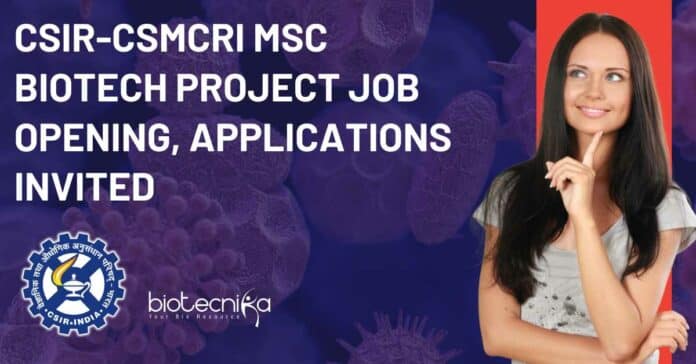CSIR-CSMCRI MSc Biotech Project Job Opening, Applications Invited
CSIR-CSMCRI MSc Biotech Project Job Opening, Applications Invited. MSc Biotechnology project associate job opening. Interested and eligible applicants can check out all of the details on the same below
Hello dear aspirants, check out some possible interview questions that we have listed at the bottom of the page for the role of project associate at CSIR-CSMCRI
This job expires in
Advt No
PDEC/SB/MMP/HCP0048/01/2023-24
ONLINE INTERVIEW
Applications are invited for Project Associate -I (PA-I) to work in the research project entitled “Carbon Capture, Utilization and Storage – Algae-based flue gas CO2 sequestration with co-production of high-value bio-chemicals” for a duration of three years.
(A) No. of post for Project Associate I: (1 Post) (CSIR, New Delhi, Sponsored Project).
Position: Project Associate – I (1 Post)
Age: (As on the last date of receipt of applications through e-mail, i.e. 21/06/2023), maximum 35 years. Age relaxation is applicable as per CSIR rules.
Duration: These positions are purely temporary. It would, not confer any right/claim implicit or explicit for any candidate for claiming absorption in CSIR- CSMCRI.
How to Apply
Interested candidates are requested to send the application form along with necessary documents for scrutiny through
e-mail to the following addresses: [email protected]. The last date of receipt of E-mail is 21/06/2023. Applications received by email will be scrutinized based on a certain criteria and only shortlisted candidates as are eligible as per the criteria will be asked to attend interview using online mode, i.e. MSTEAMS. The details of the interview will be sent to the shortlisted candidates by email.The candidates are requested to send their CV with the following details: (1) Full name and postal address with e-mail address, contact no., MSTEAMS id etc., (2) Proof of date of birth, (3) Details of educational qualifications and experience (if any) together with the scanned copies of certificates/ testimonials.
Essential qualifications for Project Associate – I:
M.Sc. Degree in Biotechnology.
Monthly Emoluments for Project Associate – I:
- Rs. 31000/- + HRA to scholars who are selected through (a) National Eligibility tests – CSIR-UGC NET including lectureship (Assistant Professorship) or GATE OR (b) A selection process through National Level Examination conducted by Central Government Department and their Agencies and Institutions.
- Rs. 25000/- + HRA for others who do not fall under (i) above.
Desirable: Candidates having research experience in the area of Microalgal Biotechnology or Valorisation of Microalgal Biomass and experience in the area of microbial fermentation would be preferred. The selected candidate will have to work on the project entitled “Carbon Capture, Utilization and Storage – Algae-based flue gas CO2 sequestration with co-production of high-value bio-chemicals” for a period of three years. The candidate would be working in optimization of upstream process, purification of γ-linolenic acid, nutraceutical formulation, process development and demonstration of the above processes.
Job Requirement: Competency in downstream processing of bioactive compounds such as γ-linolenic acid, microalgal mass cultivation, optimization of upstream conditions for improving biomass yield, and process scale up would be preferred.
Download the application format here
Hey now that you are thinking of applying for the role of Project Associate at CSIR-CSMCRI make sure you check out some of the possible interview questions below
- Can you tell us about your educational background and how your M.Sc. degree in Biotechnology has prepared you for this role?
- Answer: I have completed my M.Sc. degree in Biotechnology, which provided me with a strong foundation in various aspects of biotechnology, including microbial fermentation, downstream processing, and biomass optimization. Through my coursework and research projects, I gained practical knowledge and hands-on experience in these areas, which I believe will be valuable in contributing to the research project on “Carbon Capture, Utilization and Storage – Algae-based flue gas CO2 sequestration with co-production of high-value bio-chemicals.”
- Have you been involved in any previous research projects or work related to Microalgal Biotechnology or Valorisation of Microalgal Biomass?
- Answer: Yes, I have had the opportunity to work on research projects related to Microalgal Biotechnology and Valorisation of Microalgal Biomass during my M.Sc. program. For instance, I conducted a study on the optimization of microalgal mass cultivation techniques to enhance biomass yield and improve the downstream processing of bioactive compounds. This experience has given me insights into the challenges and opportunities in this field.
- Can you discuss your experience with microbial fermentation and its relevance to the project’s objectives?
- Answer: During my academic journey, I gained practical experience in microbial fermentation techniques. I have worked on optimizing fermentation conditions for the production of various metabolites and biomolecules. This experience will be valuable in the project’s objective of optimizing upstream processes for improving biomass yield and developing high-value bio-chemicals through the sequestration of flue gas CO2 with algae-based systems.
- How would you approach the optimization of upstream conditions to improve biomass yield in microalgal cultivation?
- Answer: Optimizing upstream conditions for microalgal cultivation involves various factors such as light intensity, temperature, nutrient availability, and pH. I would start by conducting a thorough literature review to identify the key parameters that influence microalgal growth and biomass yield. Based on this knowledge, I would design experiments to systematically evaluate and optimize these conditions, aiming to enhance biomass productivity while ensuring the sustainability and stability of the culture system.
- Can you describe any experience you have with downstream processing of bioactive compounds, particularly γ-linolenic acid?
- Answer: In my previous research project, I had the opportunity to work on the downstream processing of bioactive compounds, including γ-linolenic acid. I gained hands-on experience in techniques such as extraction, purification, and characterization of bioactive compounds from microalgal biomass. I understand the importance of optimizing these processes to obtain high purity and yield of γ-linolenic acid, which is a valuable compound with various applications.
Remember to tailor your answers based on your own experiences and knowledge. These sample questions should serve as a starting point to help you prepare for the technical round interview.
Editor’s Note: CSIR-CSMCRI MSc Biotech Project Job Opening, Applications Invited. Please ensure that you are subscribed to the Biotecnika Times Newsletter and our YouTube channel to be notified of the latest in the industry. Follow us on our social media like Twitter, Telegram, Facebo

































